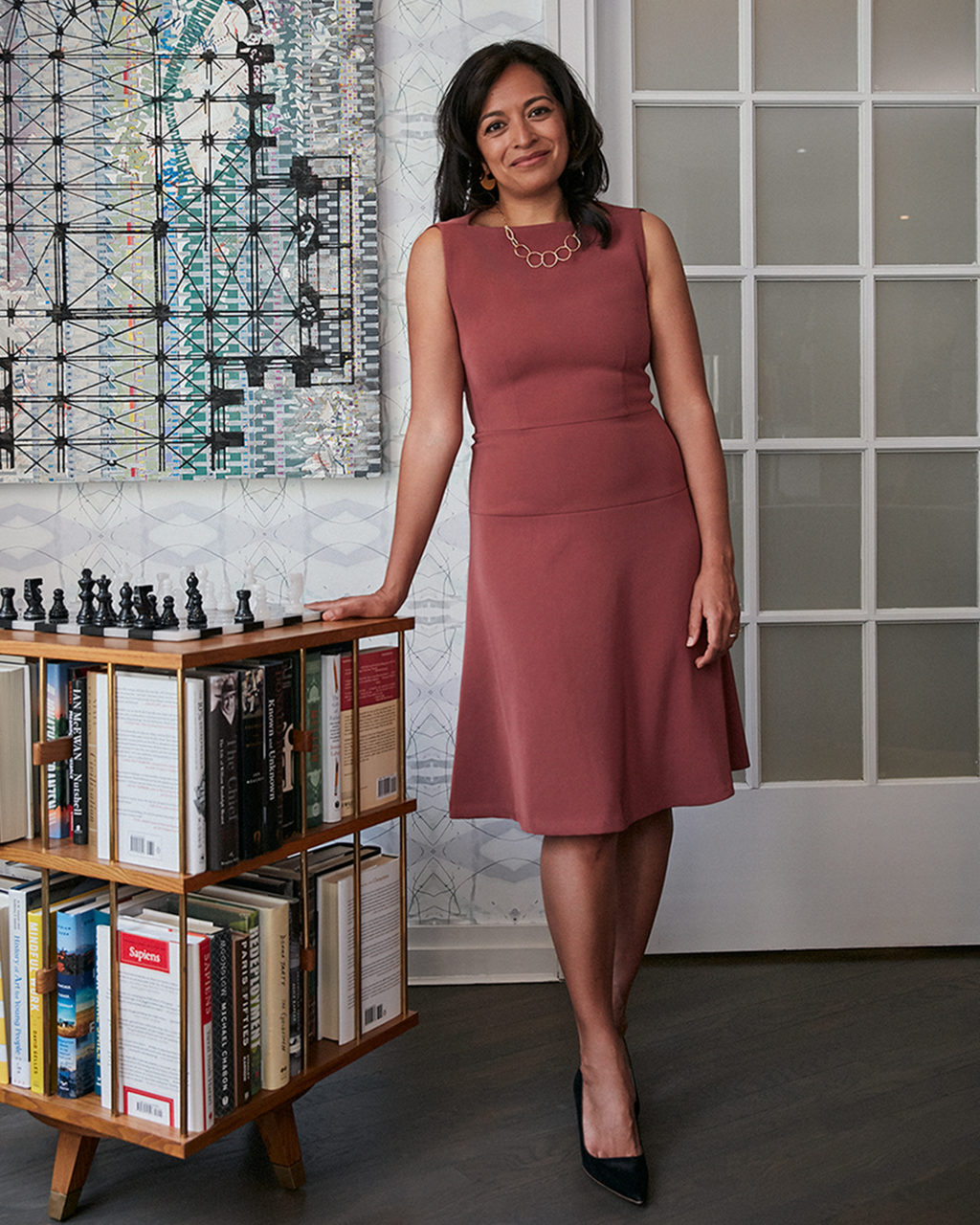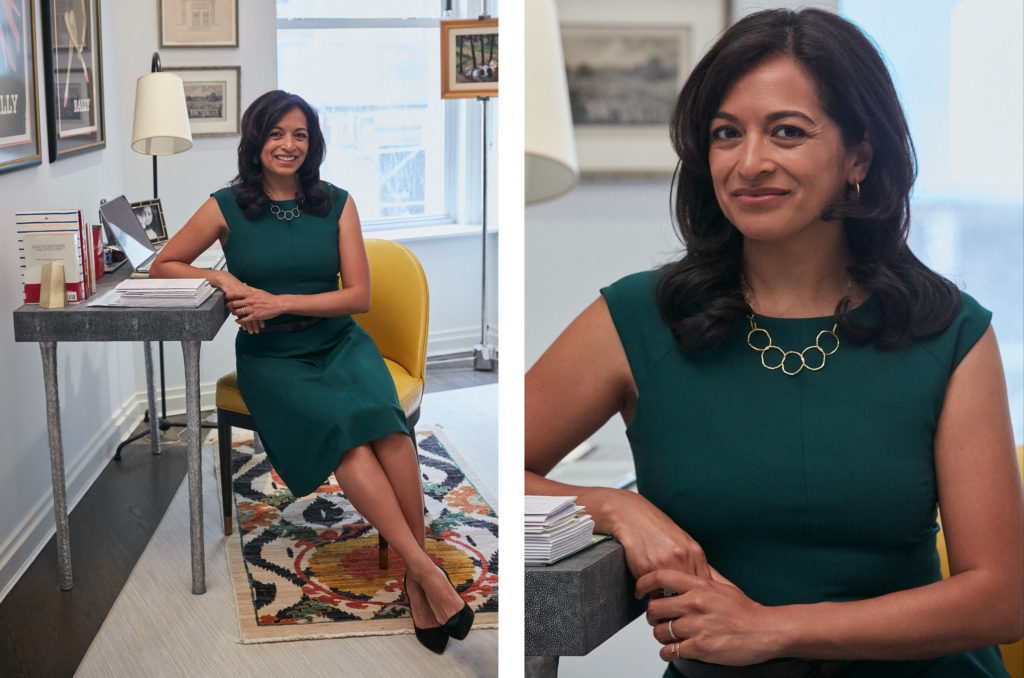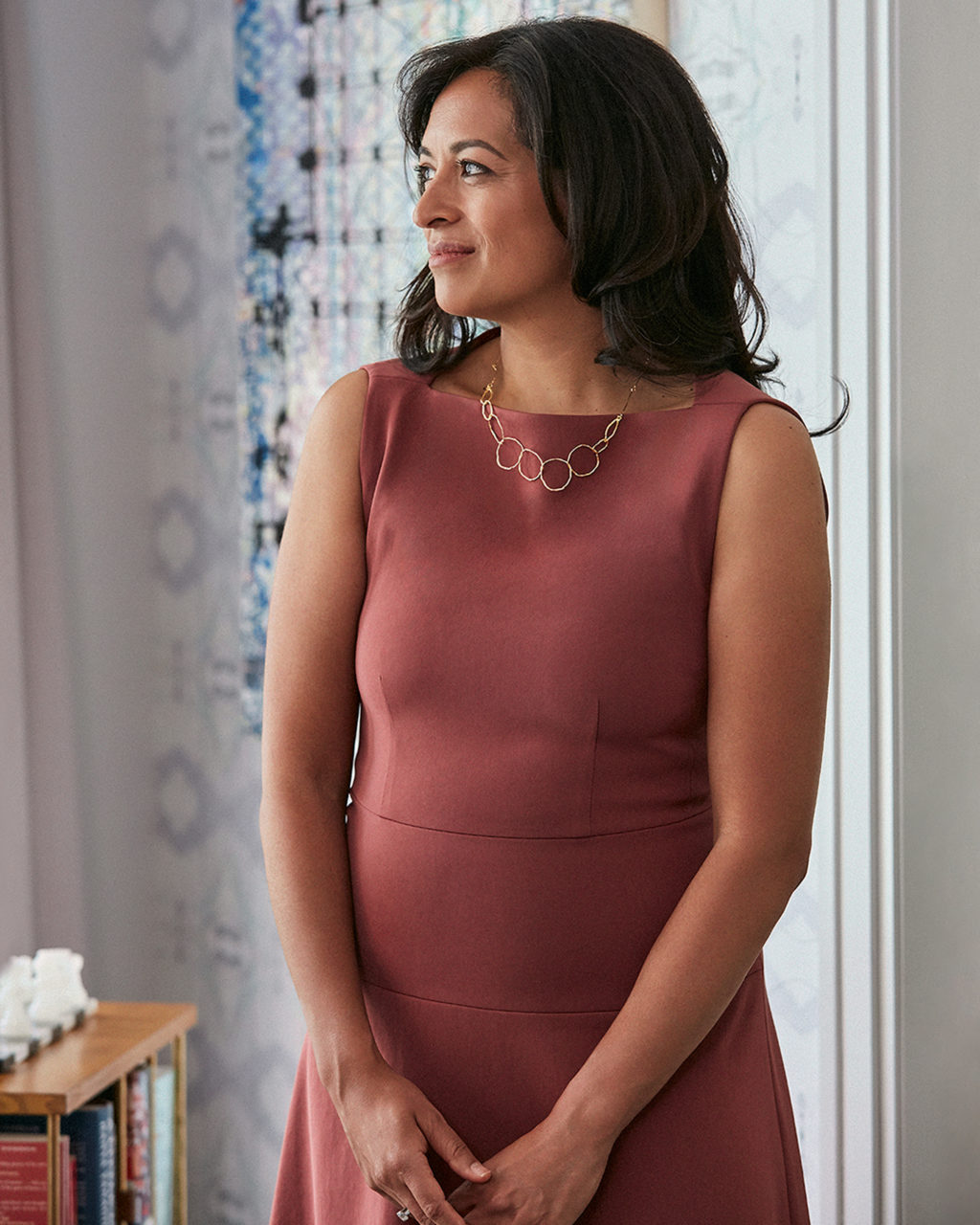Strategy Consultant Tara Abrahams on Shifting Paths and Battling Perfectionism
June 28, 2018 | Filed in: Woman of the Week
On paper, Tara Abrahams had a straight shot to professional stardom: She went to Harvard twice (for her undergraduate and business school degrees) and worked at several nonprofits before landing a director position at Girl Rising, the global campaign for girls’ education (and subject of the award-winning film with the same name). Now a strategy consultant for Girls Who Code and advisor for several other women’s education initiatives, she’s found her niche—but her route was more circuitous than it may look. Here, she talks about her battle against perfectionism, making decisions through the “gender lens,” and dressing to make an impression.
I ALWAYS GET NERVOUS speaking in front of large groups of people, even though I do it all the time. I’m someone who likes to prepare and feels most confident when I know exactly what kind of room I’m walking into. Who’s in there, and what do they care about? Doing my homework gives me an extra boost of confidence, but I do get those butterflies every single time. Whenever I have the opportunity to speak to people, the stakes are high, because I want the audience to get on board with what I’m saying. If I’m particularly jittery, I tell myself—sometimes even out loud—“This is me getting ready for what I have to do. This nervousness is my body preparing itself.”

Tara wears the Cindy dress in brick red, the Henrietta earrings, and the Helene necklace.
I PUT A LOT OF THOUGHT INTO HOW I DRESS. I want to look professional but still have my own sense of style, a little bit of edge. Words are important, but so are the way you present them—it’s the whole package. I like to wear a statement piece that’s a little unexpected and makes a lasting impression. I’ll take a classic foundation, like a beautiful dress, and mix it with something eclectic, like a necklace I got at a souk in Morocco during a business school trip. To me, things that I’ve collected over the years tell my story, and they’re almost like talismans. They help me own the spotlight that I’ve been given and remember that I have important things to say.
MY MOM IS FROM THE PHILIPPINES and my dad is from India, and they met when they were both getting their doctorates in chemical engineering at the University of Massachusetts at Amherst. As the daughter of immigrants, I felt an expectation to follow a more traditional professional path and become a doctor, as cliché as that sounds. In my early college years, that was my path. Then I recognized that I wanted my work to have some component of service and social change, and I started exploring other options.

Tara wears the Annie dress in galaxy blue and the Helene necklace.
I GREW UP IN THE SUBURBS OF CHICAGO, and my family didn’t have tremendous resources. When I began volunteering for social programs, it was profound to recognize that I had a contribution to make, and that my skills and ideas could make a difference for other people. Those experiences led me to choose my first job out of college, which was at a nonprofit called Project Health. Its mission was to mobilize college student volunteers to develop social programs at the intersection of health and poverty. For example, there is a disproportionate number of children developing asthma in low-income communities because the ventilation in their housing isn’t as good, and there are other factors like high exhaust fumes from bus depots or highways. We designed programs to try to address these issues.
I DECIDED TO GET MY BUSINESS DEGREE because, as I was helping to build and lead Project Health, I started to see an increasing demand for business skills and more traditional management skills in the nonprofit sector. Executive director roles, even at small organizations, would list “MBA” as a desired qualification. That made me sit up and take notice. I thought, Maybe I should consider business school rather than medical school. These days, social change can come from all different types of organizations, from private to nonprofit to public. I knew that getting an MBA from Harvard would set me apart if I wanted to move up as an executive in my field.

Tara wears the Toi dress in viridian, the Henrietta earrings, and the Helene necklace.
BUSINESS SCHOOL WAS EXTREMELY DIFFICULT FOR ME. I had been running a tiny little organization compared to what some of my classmates had worked on, and it was very intimidating. Believing that I had enough to offer among classmates who had led multi-million and billion-dollar deals went against all my instincts. It’s still incredible to me that I got through it—and not only survived, but made great friends. The hardest thing for me was the school’s emphasis on the case study method, which requires that students put forth ideas and arguments without a ton of information. I was accustomed to examining every single angle of a particular problem, but in business school, I needed to let go of that and be more confident taking risks. I had to get comfortable knowing that I was going to be wrong most of the time.
RIGHT NOW, I’M WORKING WITH GIRLS WHO CODE on a strategy to expand their programs globally. They’re in all 50 states, reaching 90,000 girls with coding programs, and now they’re expanding internationally. Talk about an environment where you don’t have all the answers! Every country and region has different dynamics, in terms of gender and the tech space. It’s an intellectual challenge: How much data is enough to make decisions and take risks effectively?

Tara wears the Cindy dress in brick red, the Henrietta earrings, and the Helene necklace.
I’VE HAD AN ONGOING STRUGGLE WITH PERFECTIONISM. It’s a challenge that many women have, and I’d put myself at the top of that list. If I say something and it falls flat or it doesn’t go the way that I thought it would, I have to work very hard not to obsess over it. I’m constantly asking myself, “How can I get better at letting those moments just roll off my back, and not feel like my entire reputation and professional persona have been damaged by the fact that I didn’t nail it one time?” I have a tendency to make assumptions about how people perceive me and to think about what didn’t go well, as opposed to what did. I fight against that every single day.
HERE I AM AT 42, lucky enough to have found the thing that drives me. I wish I’d discovered it a little earlier, perhaps, but to have developed my own brand that I can grow and nurture has been a gradual—and at times very scary—process. The next question is: What do I do with it? The gender space is the lens through which I look at all my decisions, professionally as well as personally. It’s how I think about educational decisions for my kids. It’s how I think about myself as a politically engaged citizen. There are moments every day when it feels like there’s no way I can do enough. But there’s no waiting in life. I’m a big believer in early interventions for girls, to help move the needle on challenges that they face around everything from unconscious bias and discrimination to unimaginable violence in parts of the world. To me, those problems are urgent, compelling, and motivating.

Tara wears the Annie dress in galaxy blue and the Helene necklace.
I ONCE READ AN INTERVIEW WITH TIFFANY DUFU in which she described her professional life as a “portfolio job.” She has a book and her writing and her speaking and her board positions—it’s a diverse portfolio of different roles. That resonated with me, because I have my projects with Girls Who Code, my board positions, my volunteer work with Harvard, my kids. Gloria Steinem has made a similar analogy with cooking: You have pots on all these different burners, and some of the pots need to be on a low simmer and other pots are on a high boil. Some will spill over from time to time. The challenge is managing all those different temperatures and turning the burners up or down when you need to.
I HAD A PRETTY IDEAL DAY YESTERDAY. It started with a breakfast meeting with a former colleague who now works at the International Rescue Committee, and I brought my five-year-old daughter with me. Then I took my daughter to school and spent the morning with her class in Central Park for their annual end-of-year field trip. Then I changed my clothes and went to Girls Who Code for the rest of the day and made some progress on a deck that we’re presenting to the board in a couple of weeks. Then I went straight to a networking event that I helped organize with a group of Harvard women. Afterward, I met up with a colleague and came back home because my husband’s out of town and I didn’t have my babysitter past nine o’clock. We ordered Thai food, opened a bottle of wine, and talked about who needs to run for office and how she thinks I should write a book. It was an exhausting but perfect and exhilarating day. They only happen once in awhile, and it’s important to appreciate them and be okay with the days that don’t look like that.
THERE ARE MOMENTS WHEN I JUST LET EVERYTHING GO, especially on the weekends, but even sometimes during the week. I don’t respond to emails. I completely detach as much as I can and I really just focus on spending time with my family. I love realizing that I have a spare half hour where I don’t have to be anywhere, and I can just walk or stop at a random coffee shop to read a couple pages of a book. Simple things are sometimes the most recharging.
Photographs by Takahiro Ogawa.





